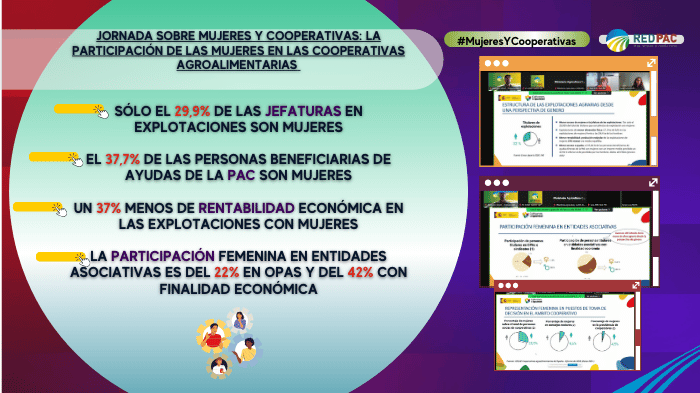
30 de September de 2024
Among the participants were the interventions of specialist technicians in developing measures to enhance the role of women in the agricultural sector, both from the public administration itself and from the cooperatives themselves.
- Under the name "Women's participation in agri-food cooperatives," the PAC Network convened various stakeholders from the agri-food sector to delve into the role of women within cooperatives.
- Some 98 people attended the portrait of the equal rights of women and men within cooperatives today.
They can do it alone, but moving forward alongside men is much better. This was expressed by the participants in the CAP Network conference on women and cooperatives: " Women's participation in agri-food cooperatives ." This hope is echoed by the data presented at the conference on women's actual participation in agri-food cooperatives: only 37.7% of CAP aid goes to women, and only 29.9% of them are heads of farms in cooperatives.
More data has been revealed regarding female representation in decision-making positions in the cooperative sector:
- Only 28.5% of all cooperative members are women.
- Only 9.6% of women sit on governing boards.
- And only 4.5% of women hold the presidency of a cooperative in all of Spain.
Likewise, and regarding female participation in associative entities, the figures say that:
- Regarding the people who are holders of takeover bids or unions, 17% are women and 24.6% are men.
- And among the working population who are paid workers in associations, 54.1% are women, compared to 58.6% who are men.
Measures for equality
The importance of these data has prompted the Spanish Ministry of Agriculture, Fisheries, and Food to launch a study ("Study of the Agricultural Workforce from a Gender Perspective"), so that a reliable analysis of this reality can help to take even more measures for agricultural equality. These new measures, which are yet to be implemented, must be added to those already in place: support for Shared Ownership , recognition of women entrepreneurs ( Excellence Awards for Innovation for Rural Women ), and support for associations that train women in the agricultural and rural sectors, among others.
Among the participants were the interventions of specialist technicians in developing measures to enhance the role of women in the agricultural sector, both from the public administration itself and from the cooperatives themselves: Agri-food Cooperatives of Spain , Agri-food Cooperatives of Extremadura , Cooperativa Vinícola del Carmen or the Association of Women of Agri-Food Cooperatives , among many others.
The event was designed to highlight the active role of women in rural areas through agri-food cooperatives and to learn about the evolution of women's participation in these cooperatives and their current representation in the sector. It also highlighted business initiatives and projects to improve women's position within these cooperatives.











